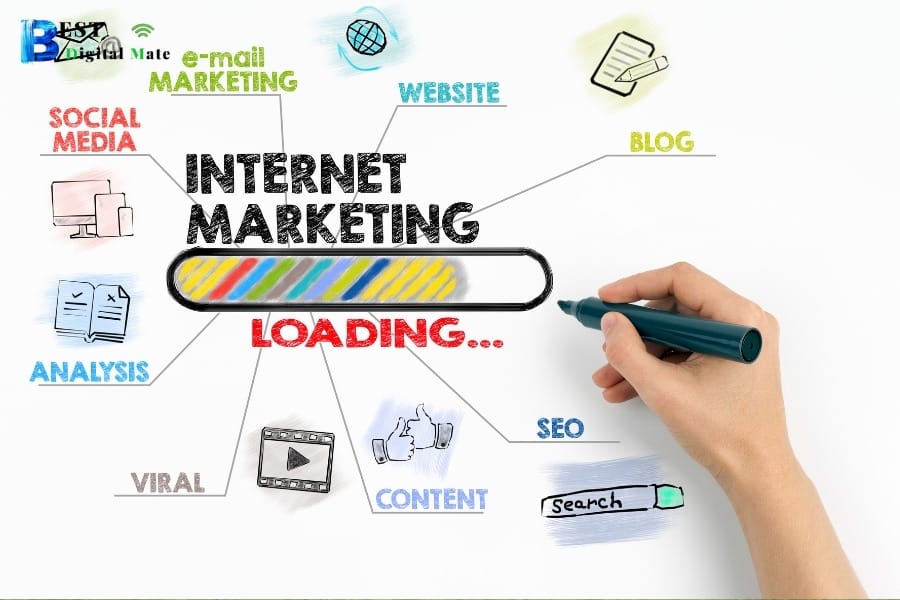There are over 4.2 billion internet users, and they use it for everything-communication, learning, shopping, and entertainment. This makes Internet marketing a crucial tool to reach your target audience and communicate with them effectively.
Internet marketing also allows for two-way communication. Creating a TV ad or print ad is one-way communication; but online marketing methods allow your audience to contact you directly.
1. SEO
Search engines, particularly Google, have become the go-to source for information about anything and everything. From a new home to accounting software, people turn to Google to find answers and solutions. That’s why SEO, or search engine optimization, is so important for your business. The goal of SEO is to make your site visible in organic searches by ensuring your pages are optimized for the keywords and phrases your audience is searching for.
SEM, or search engine marketing, is one of the seven types of internet marketing. Think of it as two sides of a coin: PPC is the paid side, while SEO is the unpaid side. Together, they form an effective strategy to drive traffic and visibility to your website. However, some businesses confuse PPC with SEO, and this can lead to ineffective results.
2. Social media
In less than a generation, social media has gone from direct electronic information exchange, to virtual gathering place, to retail platform and now, to a vital 21st century marketing tool. It enables end users to connect digitally with friends, family members and like-minded individuals they would otherwise never have found or known.
It gives them a megaphone to voice their opinions and feelings on issues that matter to them and can amplify those voices far beyond the local town square or village green. Whether companies are using it to generate brand awareness or increase sales, they are all doing social media marketing, also known as SMM (social media marketing). It falls under the umbrella of earned media alongside PR and influencer rev-share agreements. It’s an incredibly powerful and affordable way to get the word out there.
3. Content marketing
Regardless of which type of internet marketing you choose, effective content is a must. It’s the foundation that allows you to achieve SMART goals like increasing your client base.
This involves creating and distributing relevant online materials that are strategically designed to attract, engage, and convert your target audience into paying customers. It also includes generating brand awareness by promoting this material on social media and search engines.
The best internet marketers understand that content marketing requires consistency and quality over quantity. While producing more content is correlated with higher traffic, if the content isn’t high-quality, it won’t deliver your business any benefits. Focus on the most important audiences, and create different types of content for each stage of the sales cycle. For example, the awareness phase is better suited to educational and how-to content, while the consideration phase should be focused on proving your company’s value.
4. PPC
PPC, or pay per click marketing, is a way to get your ads in front of customers when they’re searching for what you offer. This form of advertising can be very effective in driving traffic and conversions to your business, if it’s done correctly.
Advertisers only pay for their ad when someone clicks on it, which makes it an extremely efficient and cost-effective form of digital marketing. Ads can be text, image or video and appear on search engine results pages (SERPs), websites and social media platforms.
The most popular PPC platform is Google AdWords, which allows advertisers to create search and shopping campaigns for their businesses. They can also use ad extensions to provide additional information about their products or services on the SERP.
5. Email marketing
Email marketing, or email outreach, is the process of sending promotional emails to a list of subscribers. It can be used to promote sales, events, new products, or special offers.
Top brands use email to reinforce their brand identity and engage with their audience in a personal way. Productivity tool Grammarly, for example, sends personalized updates to their premium users. They also use a gamification element to keep their audience engaged. Personal finance company, NerdWallet, uses an enticing subject line to lure their audience and clearly outlines their offer.
These types of emails are a great way to maintain awareness and tease future product launches. They are also a great way to drive repeat customers. In the end, it is all about building a loyal customer base that trusts your business.
